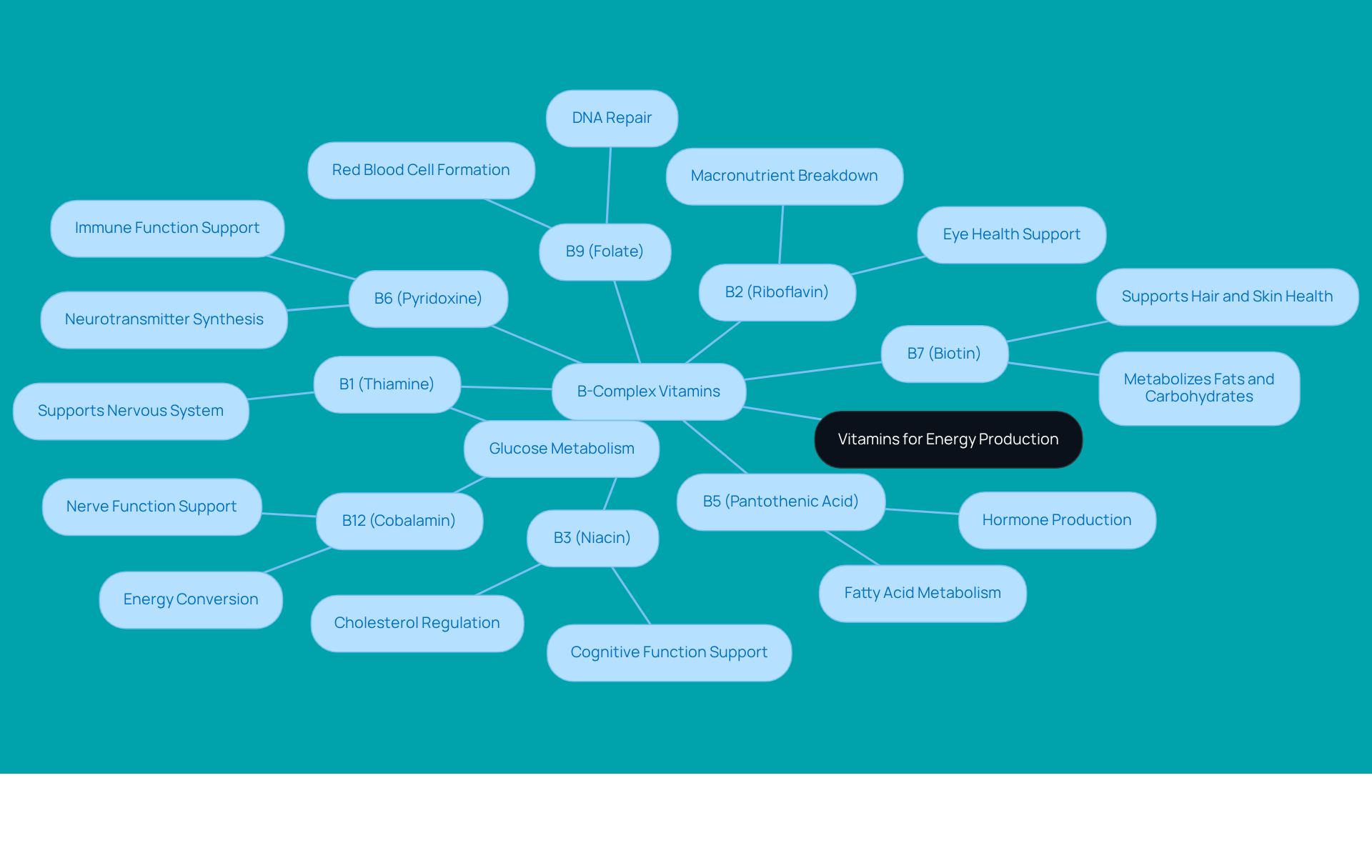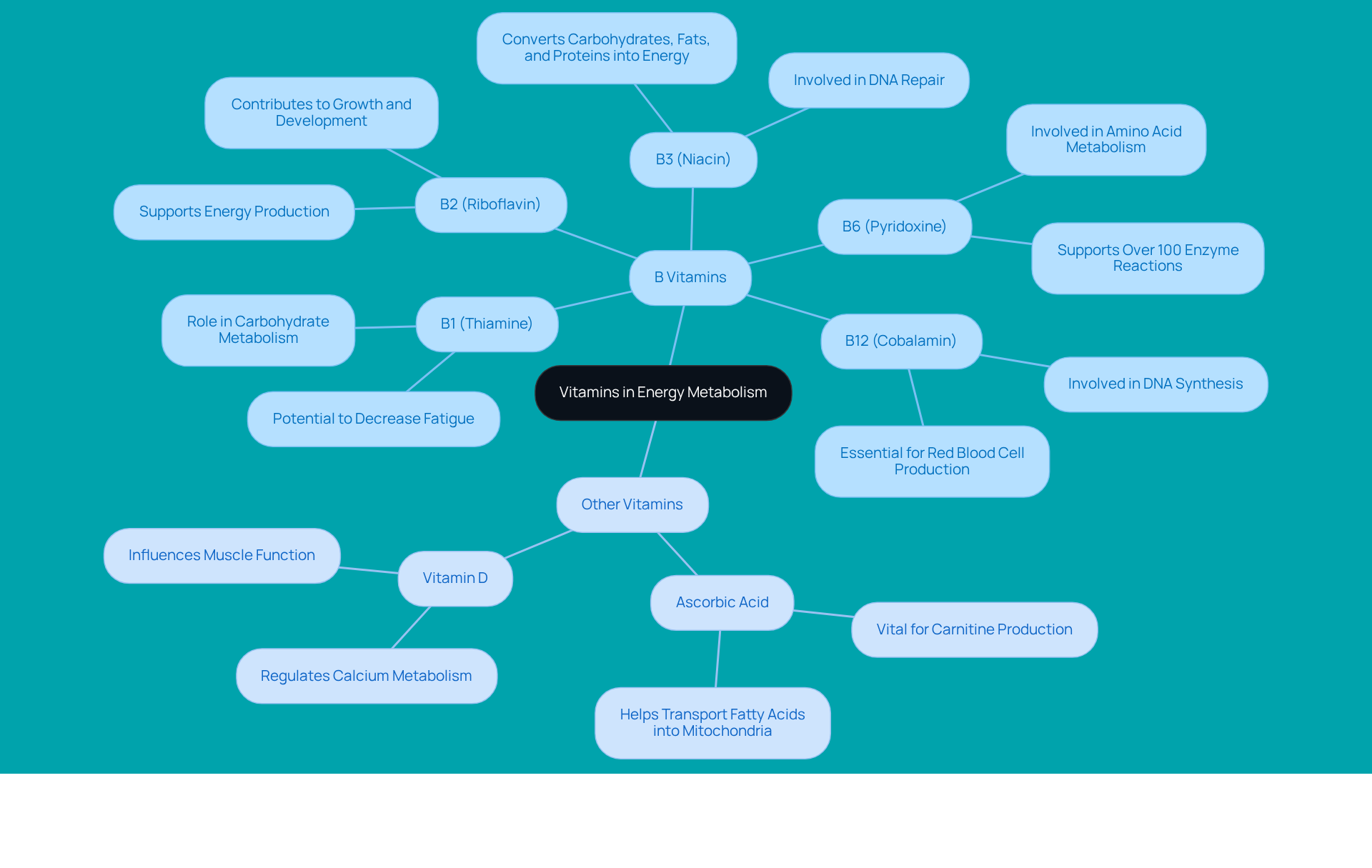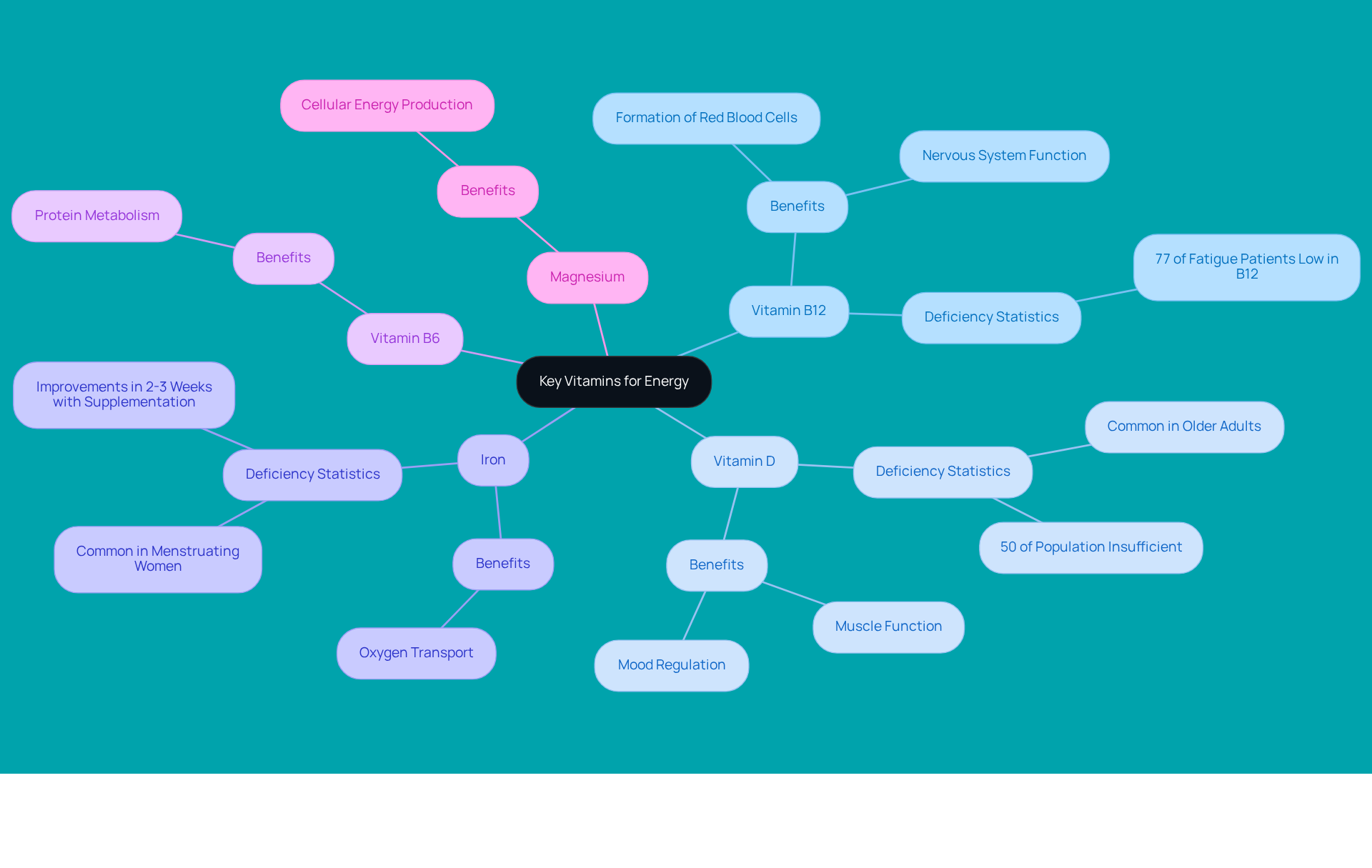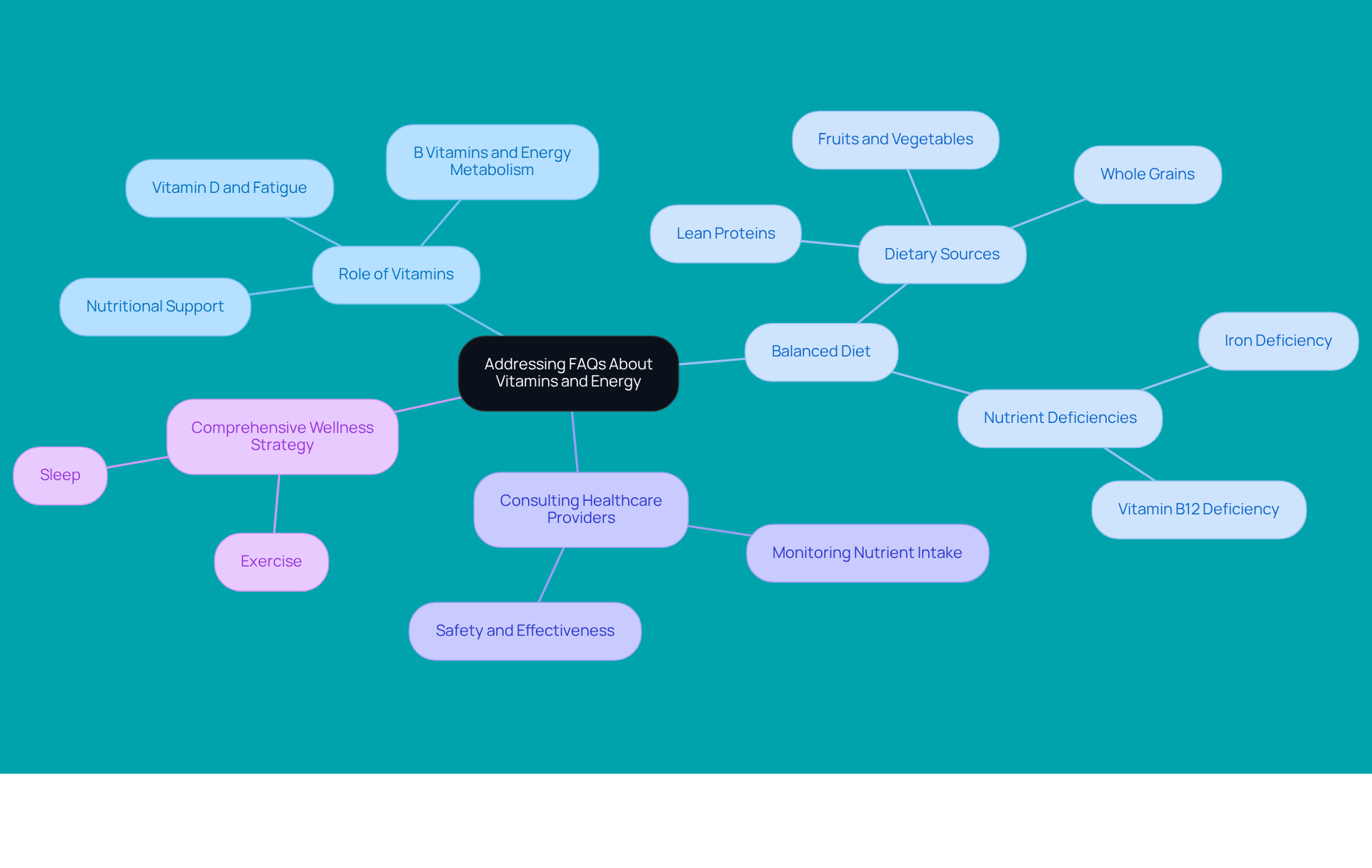Overview
Are you feeling low on energy? You're not alone. Many of us struggle with fatigue, and it can be challenging to find the right solutions. One of the best ways to boost your energy levels is through the B-complex vitamins. These essential vitamins play a crucial role in metabolizing carbohydrates, fats, and proteins into usable fuel for your body.
Imagine if you could enhance your mental clarity and prevent that midday slump. Vitamins B1, B2, and B12 are particularly important for energy metabolism, helping you feel more alert and vibrant throughout the day. By incorporating these vitamins into your routine, you can support your overall wellness and tackle your daily challenges with renewed vigor.
Taking action is simple. Consider adding B-complex vitamins to your diet, whether through food sources or supplements. Together, we can embrace a healthier lifestyle and overcome the fatigue that holds us back. Remember, you deserve to feel your best every day!
Introduction
Vitamins are essential for our body's energy production, acting as vital catalysts in the metabolic processes that sustain us. Among these, the B-complex vitamins truly shine as the best allies for energy, transforming the food we consume into the fuel that powers our daily activities. Yet, many of us may not fully grasp the profound impact these nutrients can have on our vitality and overall wellness. Imagine if you could harness the power of vitamins to combat fatigue and elevate your energy levels effectively. This exploration reveals the essential vitamins that can invigorate both body and mind, paving the way for a healthier, more energetic lifestyle together.
Defining Vitamins Essential for Energy Production
Vitamins that are the best vitamin for energy generation are organic substances playing key roles in our metabolic activities. While they don’t supply energy directly, the best vitamin for energy is essential for transforming carbohydrates, fats, and proteins into usable fuel. Among these essential nutrients, the B-complex vitamins—like B1, B2, B3, B5, B6, B7, B9, and B12—are often regarded as the best vitamin for energy production in our body. For instance, imagine how crucial Thiamine (B1) is for glucose metabolism, while Riboflavin (B2) helps break down macronutrients and supports our eye health.
You might be wondering about the C and D. These nutrients also contribute to various bodily functions that indirectly affect our vitality. Nutrient C, for example, is vital for carnitine biosynthesis, which influences our energy generation. Recent studies have shown that adequate consumption of B-complex vitamins, recognized as the best vitamin for energy, can enhance mental clarity and emotional balance, especially during stressful times or age-related cognitive changes. This underscores the importance of including these nutrients in our daily diet to promote overall wellness.
It’s also essential to recognize that a deficiency in one B vitamin can impact the absorption and function of others, highlighting their interconnected nature. As noted by the TOI Lifestyle Desk, B vitamins are indeed the best vitamin for energy, acting as unrecognized champions of our vitality, bodily functions, and cognitive well-being. Together, let’s prioritize these nutrients in our lives for a brighter, healthier future.

Understanding the Role of Vitamins in Energy Metabolism
Vitamins, particularly the best vitamin for energy, play a crucial role in our health by serving as coenzymes that help convert nutrients into energy. Have you ever thought about how B vitamins, in particular, are essential in the Krebs cycle? This vital metabolic pathway transforms the food we eat into ATP (adenosine triphosphate), the main currency of cellular energy. For example:
- B1 (thiamine) is key for carbohydrate metabolism.
- B2 (riboflavin) supports energy production through its involvement in many enzymatic reactions.
- B3 (niacin) assists in converting carbohydrates, fats, and proteins into usable energy, enhancing our overall metabolic efficiency.
Research shows that consuming enough B vitamins, which are often regarded as the best vitamin for energy, can help prevent fatigue and improve focus, especially for those of us juggling busy lifestyles or dietary restrictions. You might be wondering how contribute to our vitality. Ascorbic acid, for instance, is vital for producing carnitine, which helps transport fatty acids into mitochondria for energy generation. Vitamin D, on the other hand, plays a role in muscle function and may influence our energy levels by regulating calcium metabolism, which is essential for muscle contractions.
By ensuring we consume adequate B vitamins, we can enhance our vitality and overall health, as they are considered the best vitamin for energy. Together, let’s take the necessary steps towards a healthier lifestyle. Your health matters, and you deserve to feel your best every day.

Key Vitamins That Boost Energy Levels
Many of us are concerned about our vitality and well-being, and it’s comforting to know that several essential vitamins, such as the best vitamin for energy, can effectively enhance our energy levels. For instance, Vitamin B12 is crucial for the formation of red blood cells and the proper functioning of our nervous system, both of which directly impact our vitality. Have you ever felt fatigued? Research indicates that individuals with low B12 levels often experience fatigue, and it may take several weeks of supplementation to notice significant improvements in energy.
In a study involving 174 people who reported fatigue symptoms, 77% had low levels of this vital nutrient, underscoring how common deficiencies can be. Another important nutrient is Vitamin D, often called the 'sunshine nutrient.' It’s linked to better muscle function and overall vitality. Unfortunately, many people, especially older adults and those with limited sun exposure, face shortages of this nutrient. Alicia Arbaje, M.D., M.P.H., wisely notes that 'a D supplement is frequently a wise choice,' which highlights its importance in supporting our vitality.
Iron, while not a vitamin, is also essential for transporting oxygen in our blood. A deficiency can lead to considerable fatigue. If you have iron-deficiency anemia, you might notice improvements in your energy levels within just two to three weeks of consistently taking iron supplements. Other significant nutrients include B6, which aids in protein metabolism, and magnesium, which supports cellular energy production. However, it’s worth mentioning that B supplements may cause gastrointestinal upset for some.
By including these vital nutrients in a balanced diet or through specific supplements, we can significantly enhance our vitality and overall wellness, particularly by taking the best vitamin for energy. As Duyff states, 'Energy comes from an overall healthy diet,' reminding us that our nutritional choices should be part of a broader strategy for health. Together, let’s embrace a path towards and well-being.

Addressing FAQs About Vitamins and Energy
Many people find themselves wondering if the best vitamin for energy can genuinely enhance their vitality levels. It's important to recognize that while nutritional supplements play a vital role in our metabolic processes, they don’t offer the immediate boost of stamina that something like caffeine does. Instead, these supplements support our bodies in converting food into usable energy, which is essential for our overall well-being.
You might be asking yourself whether a balanced diet can provide all the necessary nutrients. The good news is that it usually can! A diet rich in fruits, vegetables, whole grains, and lean proteins typically supplies adequate nutrients to keep us energized. However, for those facing specific deficiencies or dietary restrictions, the best vitamin for energy can indeed be beneficial.
Before starting any new supplement regimen, it's crucial to consult with a healthcare provider. This step ensures both safety and effectiveness in your wellness journey. Did you know that nearly 1 billion individuals worldwide experience a deficiency in essential nutrients? This can lead to feelings of exhaustion and reduced vitality, highlighting the importance of .
Nutritionists emphasize that while the best vitamin for energy can aid in boosting our vitality, it should be part of a comprehensive strategy that includes regular exercise and sufficient sleep. Together, these elements work harmoniously to help us achieve peak vitality levels. If you find yourself struggling with persistent low energy, reaching out to a healthcare professional for further evaluation is a wise step forward. Remember, you’re not alone in this journey, and there are paths to feeling your best.

Conclusion
Vitamins are indispensable allies in our quest for enhanced energy and overall wellness. While they don’t provide energy directly, they play a crucial role in converting nutrients into usable fuel, with B-complex vitamins shining as the best for energy production. By focusing on these essential nutrients, we can significantly improve our vitality and cognitive function, especially during times of stress or fatigue.
Imagine how empowering it feels to understand the interconnectedness of B vitamins and their roles in metabolic processes, like the Krebs cycle, which transforms food into ATP—the energy currency of our cells. Additionally, vitamins C and D, along with minerals such as iron and magnesium, contribute to our energy levels and overall health. Ensuring we have adequate intake of these nutrients can help us combat fatigue and support a vibrant lifestyle.
Ultimately, prioritizing a balanced diet rich in these vital vitamins is essential for maintaining optimal energy levels. It’s important to consult healthcare professionals when considering supplements, particularly for those of us with dietary restrictions or deficiencies. Embracing a comprehensive approach that includes nutrition, exercise, and proper rest will pave the way for improved vitality and well-being. Together, by taking proactive steps toward enhancing our energy through vitamins, we can lead healthier, more energized lives.
Frequently Asked Questions
What are vitamins essential for energy production?
Vitamins essential for energy production are organic substances that play key roles in metabolic activities, helping to transform carbohydrates, fats, and proteins into usable fuel.
Which vitamins are considered the best for energy production?
The B-complex vitamins, including B1, B2, B3, B5, B6, B7, B9, and B12, are often regarded as the best vitamins for energy production in the body.
How does Thiamine (B1) contribute to energy production?
Thiamine (B1) is crucial for glucose metabolism, which is essential for generating energy from carbohydrates.
What role does Riboflavin (B2) play in energy production?
Riboflavin (B2) helps break down macronutrients and supports eye health, contributing to overall energy production.
How do vitamins C and D affect energy levels?
Vitamin C is vital for carnitine biosynthesis, which influences energy generation, while vitamin D contributes to various bodily functions that can indirectly affect vitality.
What benefits do B-complex vitamins provide beyond energy production?
Adequate consumption of B-complex vitamins can enhance mental clarity and emotional balance, especially during stressful times or age-related cognitive changes.
Why is it important to include B vitamins in our diet?
Including B vitamins in our daily diet promotes overall wellness and helps maintain vitality, bodily functions, and cognitive well-being.
What happens if there is a deficiency in one B vitamin?
A deficiency in one B vitamin can impact the absorption and function of others, highlighting the interconnected nature of these nutrients.




